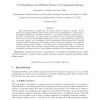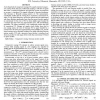99
Voted
CORR
2010
Springer
15 years 2 months ago
2010
Springer
This paper introduces a simple and very general theory of compressive sensing. In this theory, the sensing mechanism simply selects sensing vectors independently at random from a ...
95
Voted
CORR
2010
Springer
15 years 2 months ago
2010
Springer
A new framework of compressive sensing (CS), namely statistical compressive sensing (SCS), that aims at efficiently sampling a collection of signals that follow a statistical dist...
111
Voted
CORR
2010
Springer
15 years 2 months ago
2010
Springer
Recent work has demonstrated that using a carefully designed sensing matrix rather than a random one, can improve the performance of compressed sensing. In particular, a welldesign...
CORR
2008
Springer
15 years 2 months ago
2008
Springer
In this study, the proposed sensor integrates a sensing layer, a heating device, and electrodes on the substrate. The micro heater is integrated in the sensor to provide instantan...
124
click to vote
CORR
2010
Springer
15 years 2 months ago
2010
Springer
The knowledge of channel statistics can be very helpful in making sound opportunistic spectrum access decisions. It is therefore desirable to be able to efficiently and accurately...
123
click to vote
HUC
2010
Springer
15 years 2 months ago
2010
Springer
The rapid adoption of mobile devices that are able to capture and transmit a wide variety of sensing modalities (media and location) has enabled a new data collection paradigm - p...
130
Voted
ICASSP
2010
IEEE
15 years 2 months ago
2010
IEEE
— In cognitive radio, spectrum sensing is a key component to detect spectrum holes (i.e., channels not used by any primary users). Collaborative spectrum sensing among the cognit...
96
Voted
ICASSP
2010
IEEE
15 years 2 months ago
2010
IEEE
We consider a two-stage sensing scheme for cognitive radios where coarse sensing based on energy detection is performed in the first stage and, if required, fine sensing based o...
128
Voted
AAAI
1994
15 years 3 months ago
1994
Between sensing the world after every action (as in a reactive plan) and not sensing at all (as in an openloop plan), lies a continuum of strategies for sensing during plan execut...
136
click to vote
AAAI
2000
15 years 3 months ago
2000
Just as actions can have indirect effects on the state of the world, so too can sensing actions have indirect effects on an agent's state of knowledge. In this paper, we inve...


